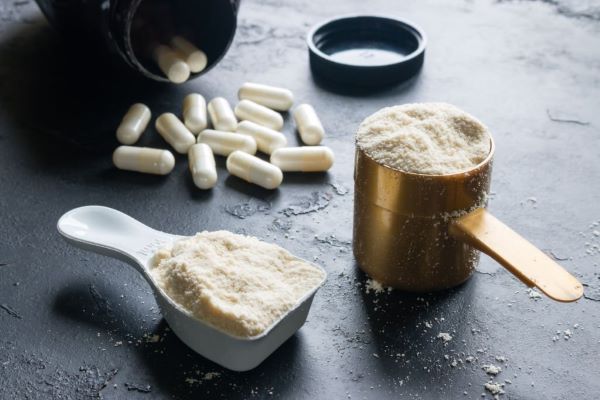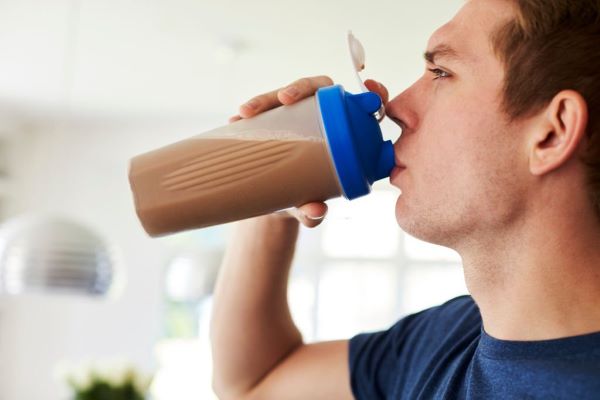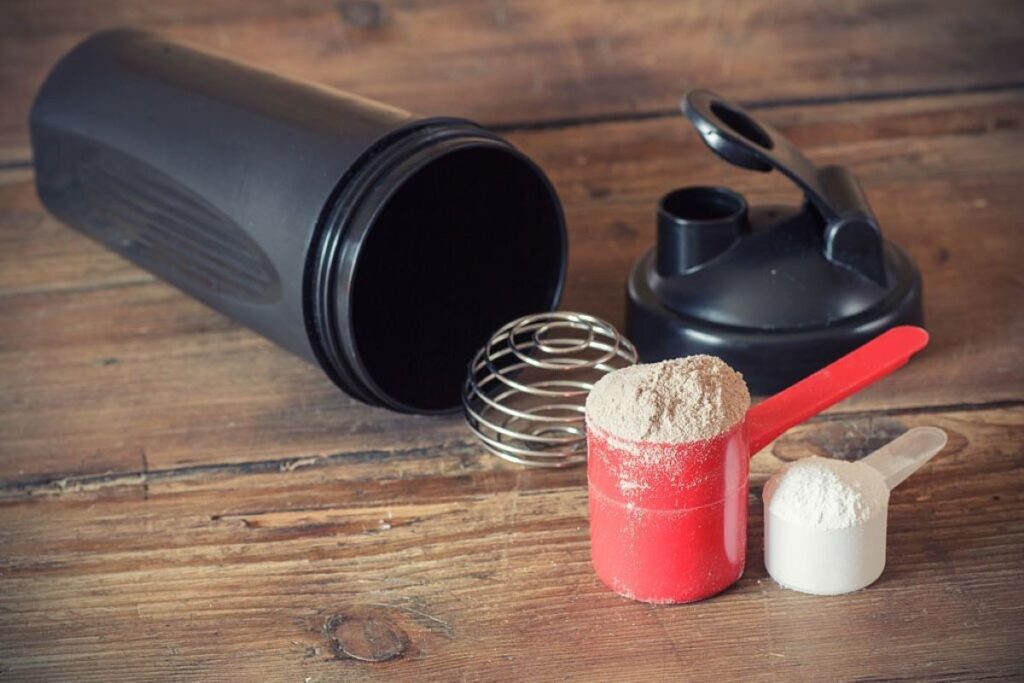Creatine helps your muscles produce energy during high-intensity exercise, while protein provides the building blocks necessary for muscle growth and repair.
Both supplements have unique benefits, can improve athletic performance, and support overall fitness goals. That leads to one simple question: Which is more beneficial, creatine vs protein?
If you wish to improve physical performance during short and high-intensity workouts, creatine is the right choice. However, if building muscle and strength is your focus, protein supplements are more suitable than creatine.
In this article, we’ll explore the differences between creatine and protein. As well as the benefits of each supplement to help you decide which is right for you.
Creatine vs Protein: Primary Differences
| Feature | Creatine | Protein |
| Purpose | Increases energy storage in muscles and enhances high-intensity exercise performance | Supports muscle growth and repair, helps maintain muscle mass, and aids in recovery after exercise |
| Source | Synthesized in the body and obtained through diet (red meat, fish) | Found in a variety of foods, including meat, dairy, eggs, and plant-based sources |
| Dosage | Typically taken in doses of 3-5 grams per day | Increased muscle mass, improved recovery, enhanced satiety, and weight management |
| Benefits | Improved exercise performance, increased muscle strength and power, improved recovery | Increased muscle mass, improved recovery, enhanced satiety and weight management |
| Side Effects | Stomach discomfort, diarrhea, nausea, muscle cramping, and weight gain | Gas, bloating, and digestive discomfort (when consumed in excess) |

Creatine vs Protein For Muscle Gain: Which One to Choose
Both creatine and protein can be helpful for muscle gain. Still, each works in different ways to support muscle growth.
Creatine
Creatine is an amino acid found in our muscles and made by the body from the amino acids arginine, glycine, and methionine. Our body produces about 1 gram of creatine daily from a typical omnivorous diet.
But those involved in muscle building and high-intensity exercises must take extra creatine for additional energy during exercise.
Creatine supplementation improves muscle recovery times and reduces muscle damage caused by intense workouts.
This makes creatine a valuable supplement for overall fitness and athletic performance.
Protein
Protein is a micronutrient essential for building and repairing muscles as muscles comprise protein fibers. It comprises amino acids and is essential for muscle growth and development.
When you engage in resistance training or other muscle-growing physical activity, the muscles undergo small tears and damage.
Protein is necessary to repair and rebuild these muscle fibers to strengthen and strengthen those torn muscles.
In addition, protein increases muscle protein synthesis, which develops new muscle protein units.
Can I Have Protein And Creatine Together?
Yes, you can take protein and creatine together. Both whey protein and creatine have qualities that support mass muscle growth. Combining protein supplements with creatine is perfectly safe and may have some positive effects.
Taking both supplements together can be particularly beneficial after a workout, as the combination can help promote muscle synthesis and replenish muscle energy stores more effectively.
Many athletes and fitness enthusiasts combine protein and creatine to enhance their workouts and improve muscle recovery. Protein provides amino acids for muscle growth and repair, while creatine helps increase muscle energy and overall performance.
However, it is essential to maintain a balanced diet and consult with a healthcare professional or a registered dietitian before starting any new supplementation regimen.

Creatine vs Whey Protein For Fat Loss
Regarding fat loss, whey protein might have a slight edge over creatine. While both supplements have different primary functions, whey protein can help promote fat loss more directly by increasing satiety, reducing overall calorie intake, and supporting lean muscle mass.
Whey protein is a high-quality protein source easily absorbed by the body. It helps you feel full for a longer time, which can help control your appetite and reduce overall calorie consumption.
Additionally, it supports the maintenance and growth of lean muscle mass, which can increase your metabolism and help you burn more calories even at rest.
Creatine can indirectly contribute to fat loss by allowing you to work out more intensely and build lean muscle mass; it is not explicitly designed for fat loss.
How To Measure How Much Protein and Creatine Do I Need?
Your body needs 0.7 grams of protein per pound of body weight to maintain normal health. But if you hit the gym regularly, the consumption needs around 1-2 grams of protein per pound of body weight.
The optimal protein dose is 20 grams for some damage to the tissue fibers in our muscles after exercise in the gym. It’s also essential for the development and growth of those damaged muscles.
On the other hand, creatine is produced naturally in our bodies. You will get both if you eat protein sources like beef, chicken, pork, and fish with a balanced diet.
A daily intake of 3 to 5 grams of creatine is sufficient for the average person.
But if you’re exercising regularly and hoping for stronger muscles, increase your creatine intake for a few days or weeks.
During this period, you will take 3 to 5 grams of creatine per day and take creatine before the workout to improve muscle recovery during the workout.

Whey Protein or Creatine For Beginners
Creatine might be a better choice for beginners primarily focused on building muscle and improving overall strength. However, if your goal is to support muscle recovery, enhance muscle growth, and improve satiety for weight management.
Beginners should first focus on establishing a healthy lifestyle, including a balanced diet and regular exercise.
FAQs
How Many Times a Day Should You Take Creatine and Protein?
Take 5 grams of creatine monohydrate four or five times daily for 5-7 days to increase creatine levels in your muscles. But the level of this proof depends on your body weight, due to which its level and quantity changes.
Does Whey Protein Contain Creatine?
Whey protein does contain small amounts of creatine, but the concentration is typically much lower than what you would find in a dedicated creatine supplement. The trace amounts of creatine in whey protein are generally insufficient to provide the performance-enhancing benefits of creatine supplementation.
Final Words
Everyone’s body more or less needs creatine and protein, but those who exercise regularly need more creatine and protein in their diet than normal people.
Both these supplements will increase your body’s performance many times than before, but it is crucial to know their correct dosage and usage rules which we have discussed nicely.
Hope you liked the article and got the correct answer to your question. If you need to know more, check the recent blogs.

I started my professional career as a sports medicine consultant in Rola, Missouri. My primary role was to suggest suitable supplements for my patients according to their pre-existing conditions and lifestyle goals. I believe a healthy lifestyle is the most important if you want to make your life really meaningfull.


